
Sri Lanka's First Humidity and Temperature-Controlled Warehouse Nears Completion Amid Political and Economic Challenges
7 months ago
Sri Lanka's First Humidity and Temperature-Controlled Warehouse Nears Completion Amid Political and Economic Challenges

In 2019, Dr. Harsha de Silva embarked on an ambitious project to revolutionize Sri Lanka's agricultural sector: Prabashwara, the country's first humidity and temperature-controlled warehouse. Designed with state-of-the-art facilities, including six chambers dedicated to produce and additional sections for processing, this facility can hold up to 5,000 metric tons of agricultural products. The project was initially set for completion in 2020 but faced significant delays due to political interference and resistance from traders concerned about the impact on their profit margins.
Despite these hurdles, Prabashwara is finally nearing completion, marking a pivotal moment for Sri Lanka's agriculture industry. The facility, located at the Dambulla Economic Centre (DEC), aims to address one of the country's most pressing economic issues: the extreme price fluctuations of locally produced fruits and vegetables. These fluctuations are often exacerbated by high transport costs and the markups imposed by intermediaries, leading to financial losses for farmers and inflated prices for consumers.
The delay in completing Prabashwara has been a sore point for many, particularly as the project was initially abandoned by the previous regime. The DEC, a critical hub for food distribution across the country, has long suffered from the wastage of significant quantities of fruits and vegetables due to the lack of proper storage facilities. This waste has not only contributed to the financial strain on farmers but also undermined efforts to ensure food security.
Dr. de Silva, whose brainchild this project was, envisioned Prabashwara as a solution to these challenges. By providing farmers with modern cold storage facilities, the project aims to stabilize prices, reduce post-harvest losses, and ultimately ensure that consumers have access to affordable, high-quality produce year-round. However, the project faced opposition from traders at the DEC, who argued that the 24-hour trading cycle made such storage facilities unnecessary. This resistance, coupled with the political instability of the time, stalled the project’s progress.
Dr. de Silva is optimistic about Prabashwara’s future. He plans to officially open the facility soon and expand similar projects across the country. These efforts are expected to significantly reduce post-harvest losses, boost farmers' incomes, and enhance the sustainability of Sri Lanka's agriculture industry.
The completion of Prabashwara is not just a win for the agricultural sector but also a testament to the perseverance required to overcome political and economic challenges. As Sri Lanka prepares for a new chapter in its governance, Prabashwara stands as a symbol of what can be achieved when innovation is paired with determination, promising a brighter future for the nation’s farmers and consumers alike.